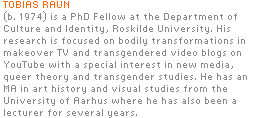
The focus on lack of trans people’s rights in Denmark was manifested this summer when the Commissioner for Human Rights, Thomas Hammarberg, visited Copenhagen for The World Outgames 2009 Human Rights Conference. The Commissioner presented twelve human rights recommendations in relation to trans people that every member state of the Council of Europe should accommodate:[3]
1. Implement international human rights standards without discrimination, and prohibit explicitly discrimination on the ground of gender identity in national non-discrimination legislation. The Yogyakarta Principles on the Application of International Human Rights Law in relation to Sexual Orientation and Gender Identity should be used to provide guidance for national implementation in this field. 2. Enact hate crime legislation which affords specific protection for transgender persons against transphobic crimes and incidents. 3. Develop expeditious and transparent procedures for changing the name and sex of a transgender person on birth certificates, identity cards, passports, educational certificates and other similar documents. 4. Abolish sterilisation and other compulsory medical treatment as a necessary legal requirement to recognise a person’s gender identity in laws regulating the process for name and sex change. 5. Make gender reassignment procedures, such as hormone treatment, surgery and psychological support, accessible for transgender persons, and ensure that they are reimbursed by public health insurance schemes. 6. Remove any restrictions on the right of transgender persons to remain in an existing marriage following a recognised change of gender. 7. Prepare and implement policies to combat discrimination and exclusion faced by transgender persons on the labour market, in education and health care. 8. Involve and consult transgender persons and their organisations when developing and implementing policy and legal measures which concern them. 9. Address the human rights of transgender persons and discrimination based on gender identity through human rights education and training programs, as well as awareness-raising campaigns. 10. Provide training to health service professionals, including psychologists, psychiatrists and general practitioners, with regard to the needs and rights of transgender persons and the requirement to respect their dignity. 11. Include the human rights concerns of transgender persons in the scope of activities of equality bodies and national human rights structures. 12. Develop research projects to collect and analyze data on the human rights situation of transgender persons including the discrimination and intolerance they encounter with due regard to the right to privacy of the persons concerned. | 






